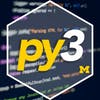Python 3 Programming Specialization – Coursera
If you want to learn Python 3, I definitely suggest this specialization: Python 3 Programming Specialization. It consists of five courses, each focusing on different aspects of programming. It will guide you through the basics of Python 3 programming and will let you learn lost of various aspects of Python 3 based development: Python basics (primitive types, variables, loops), dealing with arrays and dictionaries, writing functions. You will learn mapping and filtering of data. During the course you will have to work with REST and JSON APIs – these are the basis for the web projects. There are sections devoted to file operations, CSV files, parsing JSON data, accessing web content from Python code – summarizing, it covers lots and lots of stuff related to Python.
Even though I work with Python on daily basis, I have decided to go through all these courses to refresh few things, to learn concepts I have never used, and to systemize my knowledge.
You can find my notes here: ![]() and
and ![]() . These notes will give you the felling of how many topics are covered during the course. It’s really well prepared material, I must say.
. These notes will give you the felling of how many topics are covered during the course. It’s really well prepared material, I must say.
When it comes to the delivery, I think it’s a top notch lecture. Teachers go through all the concepts explaining them in details. Material is divided into short, encapsulated sections. It helps to learn if you can’t devote too much time at one go. Apart from the lectures there are exercises, practice materials, and projects that you are obliged to finish before passing each course.
There is one thing, that might be a little bit of a struggle for complete newcomers to Python 3. If you have no experience at all, I think that material complexity elevates a little bit at the very end. It might be challenging for people who are not familiar with coding. However, spending a little bit of time here and there should be enough to finish the course.
When it comes to summarizing Python 3 Programming Specialization in once sentence – definitely worth the time and money.
There are many options to write Python 3 code. You can use regular text editor (e.g. Sublime Text, TextMate or even Vim).
